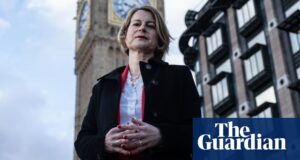Angela Rayner says she has discussed enhancing UK-US special relationship in call with JD Vance
Angela Rayner, the deputy prime minister, has spoken to JD Vance, who as vice president-elect will be her opposite number in Donald Trump’s administration when he takes office. She has posted this on social media.
Good to speak to US Vice President-elect @JDVance as UK Deputy Prime Minister.
We spoke about our plans for the future and how, working together, we build on the special relationship between our great countries.
— Angela Rayner (@AngelaRayner) November 7, 2024
Good to speak to US Vice President-elect @JDVance as UK Deputy Prime Minister.
We spoke about our plans for the future and how, working together, we build on the special relationship between our great countries.
Key events
Afternoon summary
-
Angela Rayner, the deputy PM, says she has discussed enhancing the UK-US special relationship in a call with JD Vance, the US vice president-elect. (See 5.11pm.) Hers is the latest outreach intended to ensure the Labour government can have a good relationship with Donald Trump’s administration.
-
Pat McFadden, the Cabinet Office minister, has played down concerns that derogatory comments made by David Lammy and other Labour MPs about Donald Trump in the past will harm relations when Trump takes office. (See 10.06am.)
-
McFadden has rejected suggestions that a Trump presidency will definitely be bad for the UK economy because of his tariff policies, arguing that some of the “fiery things” promised by Trump during the campaign won’t happen. (See 9.29am.)
-
David Hill, a former director of communications for the Labour party, and for Tony Blair at No 10, has died. (See 4.12pm.)
Bridget Phillipson says she wants schools to be ‘welcoming spaces’ to tackle pupil absences

Richard Adams
Bridget Phillipson, the education secretary, has said that the epidemic of pupil absences in England’s classrooms can be tackled by making schools “welcoming, engaging and inclusive spaces”.
Speaking to the Confederation of School Trusts annual conference in Birmingham, Phillipson said figures showing one in five pupils in England were persistently absent “should shock us all, a failure of society and state and our children will pay the price in years to come”.
Persistent absence is defined as a pupil missing 10% or more sessions, meaning one or more days every two weeksof school.
Phillipson warned schools against diverting problem pupils, including those with special needs, to other schools nearby.
I know the current system incentivises some to adopt a competitive rather than a collaborative model … the kind that only succeeds by pushing problems on to others. That ends now.
Phillipson said including more children and young people with special educational needs and disabilities (Send) in mainstream education was the best way to overcome the crisis in provision. She announced the appointment of Dame Christine Lenehan, director at the Council for Disabled Children, as a special ministerial adviser on Send.
The increasing number of students with special needs was reflected in new figures published by Ofqual, England’s exams regulator, showing increases in the numbers being granted extra time or help sitting GCSEs or A-level exams. Last summer three out of every 10 entrants were given 25% more time to complete their exams, a rise of 52,000 compared with 2023.
Here are some pictures from Keir Starmer’s meetings at the European Political Community summit in Budapest.
Photograph: János Kummer/Getty Images
Angela Rayner says she has discussed enhancing UK-US special relationship in call with JD Vance
Angela Rayner, the deputy prime minister, has spoken to JD Vance, who as vice president-elect will be her opposite number in Donald Trump’s administration when he takes office. She has posted this on social media.
Good to speak to US Vice President-elect @JDVance as UK Deputy Prime Minister.
We spoke about our plans for the future and how, working together, we build on the special relationship between our great countries.
— Angela Rayner (@AngelaRayner) November 7, 2024
Good to speak to US Vice President-elect @JDVance as UK Deputy Prime Minister.
We spoke about our plans for the future and how, working together, we build on the special relationship between our great countries.
Rachel Maclean, a former Conserative MP who was one of the organisers for Kemi Badenoch’s Renewal 2030 leadership campaign, has said she thinks the last Conservative government went too far in extending free childcare.
Speaking on the BBC’s Politics Live today, Maclean, who lost her seat at the election, said it was a mistake for the last government to expand the free childcare offer. Asked if that was the right choice, she replied:
No, I actually don’t think it was.
I personally struggle with that a little bit. I think we should talk more about families and encouraging responsibility of families … I’ve got four children as well and I’ve got two grandchildren now. So, this is not an abstract thing for me and my family. And combining work with children is very hard but it’s about the right way of doing it.
I don’t think the state can do all of it and I think we should empower women and parents, and fathers as well, to do more, as much as they possibly can.
Badenoch has said there is no need for the Conservative party to come up with new policies for some time. But at the party conference she was criticised after appearing to suggest that maternity pay was excessive, and Maclean’s comment may revive claims that under Badenoch and her allies support for working parents could be cut.
Former Labour party communications chief David Hill has died
David Hill, a veteran Labour spin doctor who started working for the party in the 1970s and who ended up as Tony Blair’s director of communications, has died. Unlike Alastair Campbell, whom he replaced at No 10 after Campbell left in the light of the Iraq/David Kelly controversy, Hill never became a public figure. But he was well known at Westminster and in Labour circles, and very well liked too.
Hill started working for Labour as an adviser to Roy Hattersley in the 1970s. Hattersley was secretary of state for prices and consumer protection in the Callaghan government (in those days it was deemed appropriate for the government to control prices – an idea that might seem less ridiculous now, given the way inflation led to Americans voting for Donald Trump). After 1979, Hill carried on working for Hattersley while he served as deputy leader under Neil Kinnock.
In 1991 Hill became Labour’s director of communications. Tony Blair took over as leader in 1994 and he had an inherent distrust of anyone associated with old Labour (even the Hattersley wing of it). But Blair trusted Hill for the same reason journalists did – he was straight, and thoroughly professional – and he became a key figure in New Labour’s election-winning machine.
After Labour won the 1997, Hill went into private sector PR. But in 2003 he went to Downing Street as director of communications, staying until 2007, when he left to work for Bell Pottinger.
After a Parkinson’s disease diagnosis some years ago, Hill died on Monday. The Guardian will be publishing a proper obituary in due course.
Last night the Conserative party voted against a series of budget resolutions in the Commons. Labour is now challenging Kemi Badenoch to explain what investment her party would cut.
In an open letter to the new Conservative leader, Ellie Reeves, the new Labour party chair, says:
Last night the Conservative party decided to vote against Labour’s plans to bring down waiting lists in the NHS and hire new teachers in state schools. Your party opposed £5.5bn of investment in public services – the equivalent of 10,200 nurses in our NHS, 27,600 teachers in our schools, or 39,100 police officers on our streets.
I am writing to you to confirm your official position – are the Conservatives against additional investment in our public services or would you make cuts to other public services to fund these pledges from elsewhere?
This government inherited a £22bn black hole in the public finances, a black hole that you and your shadow cabinet helped to create, along with broken public services after 14 years of Tory failure.
Labour’s budget is fixing the foundations to deliver the change Britain voted for. The chancellor announced £25.6bn in new funding for the NHS over the next two years – which will help to fund 40,000 additional NHS appointments a week – alongside funding to recruit 6,500 teachers in state schools.
Under your instruction, Conservative MPs have voted against these measures. This will be a slap in the face for communities across our country who voted for change.
Cost of ‘bat shed’ to protect colony near HS2 has topped £100m, chair says
The cost of a “bat shed” to protect a species in woodland along the new HS2 high-speed line has risen to more than £100m, HS2’s chair has revealed. Gwyn Topham has the story.
Katy Balls has written an article for the Spectator about the first shadow cabinet chaired by Kemi Badenoch, the new Conservative leader. Balls says Badenoch wants shadow cabinet meetings to be smaller than they used to be so they are less likely to leak. “It’s a shame our discussions in shadow cabinet were leaked,” Badenoch said in July, after what was said at the first meeting of the shadow cabinet since the general election was leaked. “If there is no private space to discuss our party’s challenges, we will never fully address what the electorate told us last week.”
Thankfully, the campaign against shadow cabinet leaking does not seem to be working. Balls seems to have had a very thorought readout, and her account is an excellent read. Here’s an extract.
Iain Duncan Smith gave a presentation on how to do opposition well. While a respected figure, it raised some eyebrows around the table given his own struggles as leader. He urged the new frontbench to wage the war of the flea. He explained that the Labour government represented a big elephant and it was the job of the remaining Tories to do the job of the flea: they can’t match their opponent in size but they can annoy and confuse.
As for the general strategy, the new Tory co-chairman Nigel Huddleston was asked what the plan was to win back Reform party voters. He said he was looking into it. The most interesting intervention came at the end of the meeting from [Robert] Jenrick. After a rather bitter leadership contest, he made a big point of calling for unity. ‘Your success is our success,’ he told Badenoch. The comments landed well with the new leader – but not everyone was convinced. ‘It was the most insincere thing I’ve ever seen,’ said one colleague afterwards.
‘Words fail me’ – Scottish Greens’ co-leader Patrick Harvie condemns Swinney for congratulating Trump

Libby Brooks
John Swinney was accused of “extraordinary complacency at a time of incredible danger for the world” by Scottish Greens co-leader Patrick Harvie at this lunchtime’s first minister’s questions session.
Harvie was referring to Swinney’s official response to Donald Trump’s win – issued despite the first minister having told reporters he supported Kamala Harris last week. Harvie said:
He wrote that he is sure Scotland’s cultural and social ties with the US will flourish during the presidency of a misogynist, a climate denier, a fraudster, a conspiracy-monger, a racist, a far-right politician who tried to overturn an election result, both covertly and by inciting violence. Words fail me. What social and cultural ties does the first minister really think will benefit from a relationship with such a man?
Swinney responded that, as first minister of Scotland, he had a duty to engage with other governments and that there were deep cultural, social and economic ties between Scotland and the USA.
But he added:
There are, very clearly, very big, real differences in expression and in priority and in way of life between me and Donald Trump.
Rachel Reeves, the chancellor, has played down claims that David Lammy’s past comments condemning Donald Trump could harm UK-US relations.
Speaking to reporters in Manchester, and echoing the line taken by Pat McFadden in interviews this morning (see 10.06am), she said:
Well, look, the vice president-elect of the United States has used some choice words about the president-elect in the past, but the point is those comments were in the past.
The prime minister and the foreign secretary met with President-elect Trump just a few weeks ago in New York for dinner.
They had a really good meeting a constructive meeting and I have absolutely no doubt we will be able to work constructively with the new US administration under President-elect Donald Trump.




